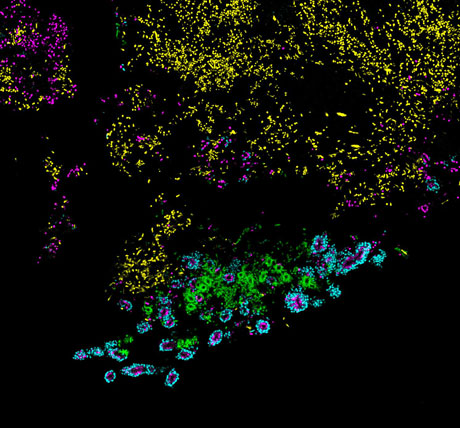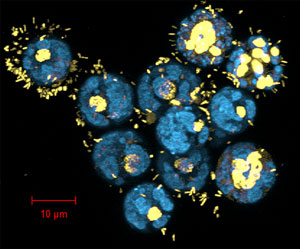Scientists Call for Unified Initiative to Advance Microbiome Research

A group of leading scientists representing a wide range of disciplines has formed a unified initiative to support basic research, technological development, and commercial applications to better understand and thoughtfully harness capabilities of Earth's vast systems of microorganisms.
In a Science article published Oct. 30, 2015, 17 U.S. scientists--including microbiologists, physicists, chemists and physicians--will announce the creation of the Unified Microbiome Initiative (UMI), an interdisciplinary consortium of 48 scientists that will coordinate areas of microbial research and make funding recommendations to federal agencies, private foundations, and corporate partners. A similar statement from a group of European scientists will be issued this week in Nature.
 Bacteria from the human mouth. Credit: Jessica Mark Welch/MBL
Bacteria from the human mouth. Credit: Jessica Mark Welch/MBL"Microbiology is coming to a point where it's extraordinarily evident that bacteria, fungi, and viruses play a massive role in the development of health and disease in humans, in environmental settings and ecological systems," said Jack Gilbert, Associate Professor in the Department of Ecology & Evolution at the University of Chicago. Gilbert is one of the founding members of the UMI governing board and is also a group leader for microbial ecology at Argonne National Laboratory and a scientist at the Marine Biological Laboratory (MBL) in Woods Hole, Mass.
"We need to unify ourselves across the different disciplines to integrate our research objectives towards a common goal. We can do that in small cohorts at the moment, but the Unified Microbiome Initiative will create the infrastructure to come together under a single umbrella," Gilbert said.
The initiative is modeled after the BRAIN Initiative (Brain Research through Advancing Innovative Neurotechnologies) launched by the White House in 2013, a decade-long effort to support research on the human brain. The UMI will provide guidance about how federal agencies, private foundations and commercial entities can direct funding for integrated microbiome research. This will allow disparate agencies, such as the National Institutes of Health, U.S. Department of Energy and their private partners, to coordinate efforts beyond their individual mandates and support broader research objectives.
 Cells of the unicellular green alga Scenedesmus rotundus. Credit: Elena Lopez Peredo and Zoe Cardon/MBL
Cells of the unicellular green alga Scenedesmus rotundus. Credit: Elena Lopez Peredo and Zoe Cardon/MBL“We know that microbes are the stewards of Earth’s life support systems and have been for billions of years,” said Zoe Cardon, a Senior Scientist at the MBL and a member of the UMI Consortium. “Within UMI, we can work toward learning from the microbes how these systems work, and with that knowledge, consider the potential promise and potential risks of channeling microbial activities to improve health, food and fuel supplies, or even to counter global climate change.”
The UMI will organize participating institutions into several consortia based on expertise, allowing researchers to collaborate across disciplines with shared infrastructure and resources. In the Science article, the authors identify areas of emphasis for initial development, including genetic and chemical analysis of microbes, imaging and visualization technology, computational modeling and informatics, and development of model systems.
According to MBL President and Director Huntington Willard, “This new initiative aligns very well with major themes in the MBL’s new strategic plan. Since the mid-2000s, the MBL has been a leader in developing technologies to visualize and analyze microbial communities and their members. As this field expands, the UMI will accelerate the development of new platforms, and the MBL will be very well positioned to contribute substantially.”
Initial discussions with participating academic institutions, funding agencies, and industrial partners are underway, and the group plans to develop a baseline funding proposal by 2017.
"Realizing the goals of the UMI will require a continuing and well-resourced public-private effort," the authors write in Science. "Fueled by the energy and vision of the scientific community and cross-cutting public and private partnerships, the UMI will lead to scientific insights, technological advances, and economic opportunities of lasting benefit to future generations."
Also participating in the UMI is MBL adjunct scientist Colleen Cavanaugh of Harvard University.
Adapted from a press release provided by University of Chicago Medicine.
Citation:
Paul Alivisatos, Martin J. Blaser, Eoin L. Brodie, Miyoung Chun, Jeffery L. Dangl, Timothy J. Donohue, Pieter C. Dorrestein, Jack A. Gilbert, Jessica L. Green, Janet K. Jansson, Rob Knight, Mary E. Maxon, Margaret J. McFall-Ngai, Jeff F. Miller, Katherine S. Pollard, Edward G. Ruby, Sharif A. Taha, The Unified Microbiome Consortium. A Unified Initiative to Harness Earth’s Microbiomes. Science 350: 503–504 (Oct. 30, 2015).
—###—
The Marine Biological Laboratory (MBL) is dedicated to scientific discovery and improving the human condition through research and education in biology, biomedicine, and environmental science. Founded in Woods Hole, Massachusetts, in 1888, the MBL is a private, nonprofit institution and an affiliate of the University of Chicago.